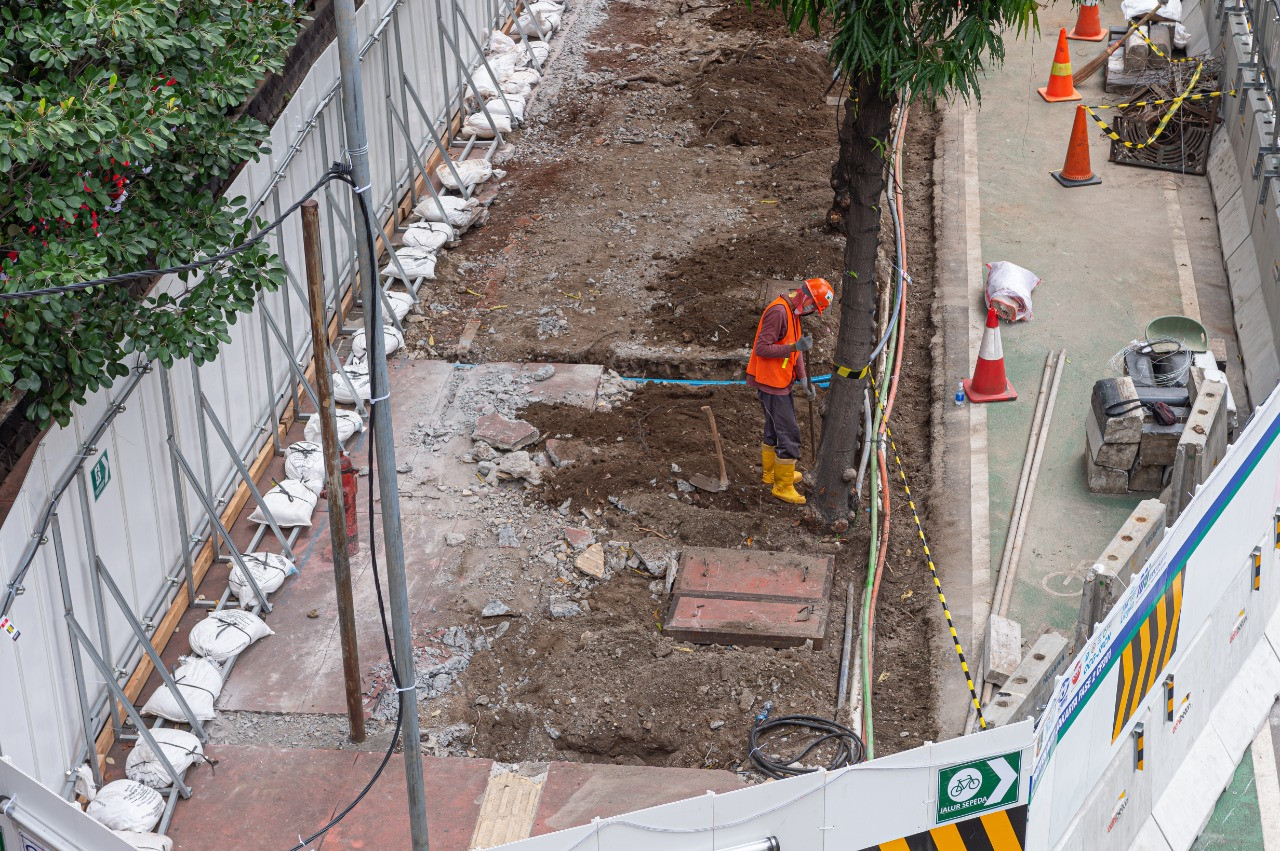Popular Reads
Top Results
Can't find what you're looking for?
View all search resultsPopular Reads
Top Results
Can't find what you're looking for?
View all search resultsJakarta MRT developer keen not to dig up trouble in route expansion
Change text size
Gift Premium Articles
to Anyone
T
he expansion of the Jakarta MRT is under way, building on a successful launch last year. But unlike the first phase of development that resulted in a 15.7-kilometer line connecting South and Central Jakarta, phase 2A offers a bigger and more unlikely challenge.
With the next phase of development set to happen entirely underground, PT MRT Jakarta is wary of accidentally excavating historical artifacts and other archeological findings in the digging process, possibly resulting in delays.
The construction of an underground tunnel along the route, believed to be blanketed in historical value, will require special care so as not to cause any delays for the project, said William Sabandar, president director of the city-owned transportation company.
Furthermore, the planned route will run through Kota Tua, formerly an administrative center of the city under Dutch colonial rule, which experts believe may hold numerous historical riches underneath.
“[The next phase] has a different scale because the level of difficulty is [exceptionally high], with issues like land subsidence and soft soil, the environment and cultural heritage,” William said earlier this week.
Archaeologist Chandrian Attahiyat, a member of the Jakarta Cultural Heritage Experts Team (TACB), acknowledged that the second phase of development would be more challenging.
“The MRT phase 2 route presumably contains many artifacts, especially from Monas [the National Monument] to Kota Tua. Monas alone is situated within the Weltervreden area, which was once the site of the new capital city that was relocated from Kota Tua or Batavia,” he said on Wednesday.
But Indonesia won’t be the first country to deal with such concerns.
The completion of a 13.68-kilometer undersea rail tunnel, part of the Marmaray intercontinental railway network in Istanbul, Turkey, was originally scheduled for completion in 2009. But the project was delayed for four years due to the discovery of archaeological artifacts from the fourth century Byzantine Era, the New York Times reported.
The development of MRT phase 2A in Jakarta, funded by the Japan International Cooperation Agency (JICA), is scheduled to be completed by March 2026. It has been delayed three months from the original plan due to the COVID-19 outbreak.
The plan spans 5.8 kilometers from Bundaran HI Station in Central Jakarta to the Kota Tua district in West Jakarta. It will consist of seven underground stations: Thamrin, Monas, Harmoni, Sawah Besar and Mangga Besar stations in Central Jakarta, as well as Glodok and Kota stations in West Jakarta.
In an effort to prevent any more delays, the company put together a team of experts, including archaeologists and cultural heritage experts, before construction commenced on July 15.
The firm, in consultation with the team, has since performed an archaeological test pit, a method which aims to identify heritage remains through small-scale excavation.
“[We did this] because we know it usually takes time to gather experts, conduct examinations and make decisions on whether an object is classified as a piece of cultural heritage,” MRT Jakarta construction director Silvia Halim told journalists on Tuesday.
“The team will investigate and conclude the status of the findings – including where to preserve it – within 21 days. With this approach, we can take action without compromising progress in the project,” she said.
The company is examining several fragments of ceramics that its construction workers and the expert team recently found while digging along Jl. MH Thamrin and through a structural brick near Monas, Silvia said.
In the 19th century, a residential area was once situated on the site where Jl. MH Thamrin runs through, right in the vicinity of Sarinah. Meanwhile, before Monas was erected, a number of large buildings, including a police station and church, were situated there.
The discrepancies in land use have contributed to the historical characteristics of remains that may potentially be found in said areas, Chandrian said.
“[Artifacts] in Monas could probably be found in the form of structures. The soil [in Weltervreden] often gets heightened due to floods,” he said.
Heading toward Kota Tua, the archeologist said there might potentially be a discovery of remains of wooden foundations. He said people in the past would have set up wooden foundations first to distribute strength equally for a building’s structure due to the unstable soil on site.
Depending on the significance of the archeological findings, the company may choose to alter its plan for the MRT line.
“If a significant archaeological finding is discovered, [the expert team] will give its recommendations to MRT Jakarta to change its project plan. This could be done by shifting or deepening the track because artifacts are commonly found 10 meters underground,” Chandrian said.
The significance of the discovery will depend on a number of factors, such as its notable relevance to history and the size of the object found, among other things.
The Jakarta Cultural Agency’s protection department head, Novriandi S. Husodo, said the team of experts was likely to suggest thorough documentation – called preservation by record – even if the findings turned out not to be of significant historical value.
More importantly, he said the establishment of an expert team and its corresponding work procedures would prove to be a good example for future large-scale infrastructure projects and provide a “win-win solution”.
“The findings won’t hinder development and the development won’t erase historical information […] Both aspects can work together,” Novriandi said.










